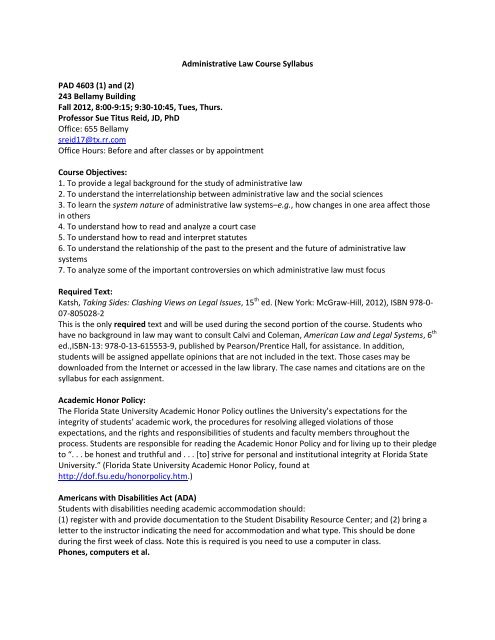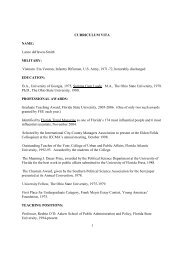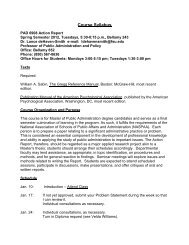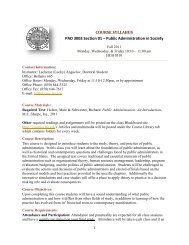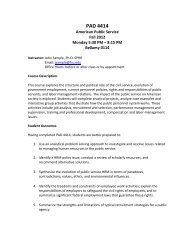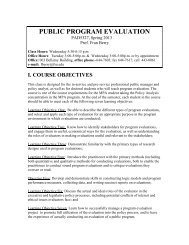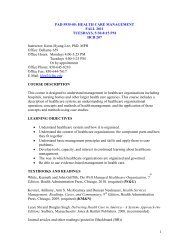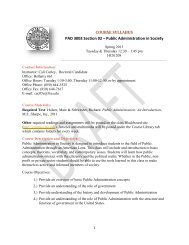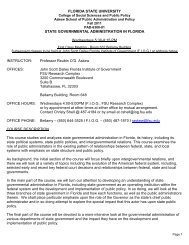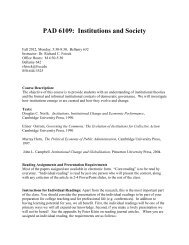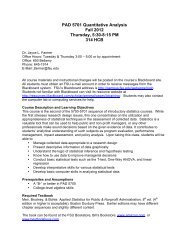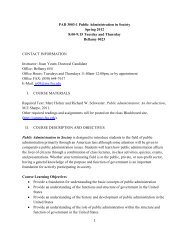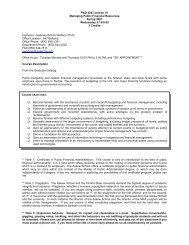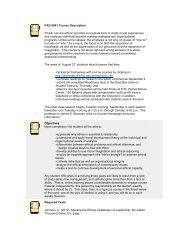Administrative Law Course Syllabus PAD 4603 (1) - Askew School ...
Administrative Law Course Syllabus PAD 4603 (1) - Askew School ...
Administrative Law Course Syllabus PAD 4603 (1) - Askew School ...
You also want an ePaper? Increase the reach of your titles
YUMPU automatically turns print PDFs into web optimized ePapers that Google loves.
<strong>Administrative</strong> <strong>Law</strong> <strong>Course</strong> <strong>Syllabus</strong><strong>PAD</strong> <strong>4603</strong> (1) and (2)243 Bellamy BuildingFall 2012, 8:00-9:15; 9:30-10:45, Tues, Thurs.Professor Sue Titus Reid, JD, PhDOffice: 655 Bellamysreid17@tx.rr.comOffice Hours: Before and after classes or by appointment<strong>Course</strong> Objectives:1. To provide a legal background for the study of administrative law2. To understand the interrelationship between administrative law and the social sciences3. To learn the system nature of administrative law systems–e.g., how changes in one area affect thosein others4. To understand how to read and analyze a court case5. To understand how to read and interpret statutes6. To understand the relationship of the past to the present and the future of administrative lawsystems7. To analyze some of the important controversies on which administrative law must focusRequired Text:Katsh, Taking Sides: Clashing Views on Legal Issues, 15 th ed. (New York: McGraw-Hill, 2012), ISBN 978-0-07-805028-2This is the only required text and will be used during the second portion of the course. Students whohave no background in law may want to consult Calvi and Coleman, American <strong>Law</strong> and Legal Systems, 6 thed.,ISBN-13: 978-0-13-615553-9, published by Pearson/Prentice Hall, for assistance. In addition,students will be assigned appellate opinions that are not included in the text. Those cases may bedownloaded from the Internet or accessed in the law library. The case names and citations are on thesyllabus for each assignment.Academic Honor Policy:The Florida State University Academic Honor Policy outlines the University’s expectations for theintegrity of students’ academic work, the procedures for resolving alleged violations of thoseexpectations, and the rights and responsibilities of students and faculty members throughout theprocess. Students are responsible for reading the Academic Honor Policy and for living up to their pledgeto “. . . be honest and truthful and . . . [to] strive for personal and institutional integrity at Florida StateUniversity.” (Florida State University Academic Honor Policy, found athttp://dof.fsu.edu/honorpolicy.htm.)Americans with Disabilities Act (ADA)Students with disabilities needing academic accommodation should:(1) register with and provide documentation to the Student Disability Resource Center; and (2) bring aletter to the instructor indicating the need for accommodation and what type. This should be doneduring the first week of class. Note this is required is you need to use a computer in class.Phones, computers et al.
No technological devices may be used in the classroom with the exception of laptop computers usedsolely for the purpose of the course and after permission is granted by the instructor. That will be doneonly with proper medical authorization. There will be no exceptions.Attendance Policy:There is an attendance element to the grade as noted later. The instructor will call the roll at thebeginning of each class. Any student who is not present at that time will not be given credit forattendance at that class unless the student has an approved absence, which must be requested inwriting and accompanied by proper authorization. No late arrivals will be counted as present.Exams:Two objective exams consisting of 50 questions each will be given. They must be taken as scheduledunless prior permission is granted by the professor (such permission is rarely given and only underextraordinary circumstances) or the student has an extreme emergency. All medical reasons for missingexams must be documented by medical personnel who have actually seen and treated the studentimmediately prior to or during the assigned class period at issue. Any student who has permission totake a make-up exam and cannot do so during the semester at the scheduled time for makeups will begiven an Incomplete for the course. To remove that Incomplete, the exam must be taken during theregularly scheduled time for that exam during the following semester. That exam may differ in contentand form. The exams may cover any material presented during the classes whether by instructor orduring student presentations. The test scores will not be curved.Student Presentations:Early in the semester each student will be assigned a topic for further study. During the latter part of thecourse students will present their findings on this topic to the class for discussion and debate. The topicsare noted later in this syllabus. Details concerning this assignment, along with topics assigned, will bepresented to the class on Tuesday, September 11.Students must be present on that day or make prior arrangements with the instructor. Failure to do socould result in a required term paper rather than a presentation.Grades:The grading scale will be approximately as follows:A = 90-100 (A- for 90-94)B = 80-89 (B+ for 87-89, B for 84-86, B- for 80-83)C = 70-79 (C+ for 77-79, C for 74-76, C- for 70-73)D = 60-69 (D+ for 67-69, D for 64-66, D- for 60-63F = below 60 zero for any assignment not completedGrades will be based on the following:First exam 100 pointsSecond exam 100 pointsClass presentation 100 pointsResearch for class presentation 150 pointsClass attendance 150 pointsThe instructor may add up to 50 points for any student whose class participation is exemplarythroughout the semester.
Class assignments by class date: Cases must be downloaded from onlineAug. 28 Introduction to the course: Statutory constructionU.S. v. X-Citement Video, Inc., 513 U.S. 64 (1994)30 Functions of <strong>Law</strong> in Society and Introduction to types of law:Bob Jones University v. United States, 461 U.S. 574 (1983)Sept. 4 The function of courts and the role of administrative law: Focus on the hands-off policy towardadministrative agenciesRuffin v. Commonwealth, 62 Va. 790 (Va. 1872)Wolff v. McDonnell, 418 U.S. 539 (1974)6 Constitutional <strong>Law</strong>: the foundation of <strong>Administrative</strong> <strong>Law</strong>; Judicial review of administrative andcourt decisionsMarbury v. Madison, 5 U.S. 137 (1803)11 Limitations of <strong>Law</strong>: Judicial restraint; Standing; Mootness and Ripeness; Political Questions;Jurisdiction; Venue; Statutes of Limitation; Conflict of laws; right to privacy<strong>Law</strong>rence v. Texas, 539 U.S. 558 (2003)Eisenstadt v. Baird, 405 U.S. 438 (1972)(not required)Bowers v. Hardwick, 478 U.S. 186 (1986)(not required)13 The requirement of due process in administrative decisionsMempha v. Rhay, 389 U.S. 128 (1967)Morrissey v. Brewer, 408 U.S. 471 (1972) (not required)18 <strong>Administrative</strong> law and criminal law comparedFerguson v. Charleston, 532 U.S. 67 (2001)McKnight v. South Carolina, 378 S.C. 33 (2008) (not required)20 <strong>Administrative</strong> law and tort law comparedPalsgraf v. Long Island Railroad, 248 N.Y. 339 (1928)25/27 Study days for class presentations and first testOct. 2 <strong>Administrative</strong> law and delegation theoryGreenholtz v. Inmates of Nebraska Penal and CorrectionalComplex, 442 U.S. 1 (1979)<strong>Administrative</strong> law and adjudication: Right to a hearingGoldberg v. Kelley, 397 U.S. 254 (1970)4 First Student Presentation: <strong>Administrative</strong> duty to warn:Tarasoff v. CA., 17 Cal.3d 425 (1976)Oct. 9 Test over all material covered thus farRemaining presentation dates and topics: All of the following assignments are from the required textand are listed by number and case name.
Oct. 11 Katsh, No. 20, Grutter v. Bollinger, 539 U.S. 306 (2003).16 Katsh, No. 18, Virginia v. Black, 538 U.S. 343 (2003).18 Katsh, No. 11, Morse v. Frederick, 551 U.S. 393 (2007).23 Katsh, No. 12, Safford v. Redding, 557 U.S. 364 (2009).25 Katsh, No. 10, Snyder v. Phelps, 131 S.Ct. 1207 (2011).30 Katsh, No. 5, Washington v. Glucksburg, 521 U.S. 702 (2001).Nov. 1 Katsh, No. 16, Kyllo v. United States, 533 U.S. 27 (2001).6 Katsh, No. 13, Roper v. Simmons, 543 U.S. 551 (2005).8 Katsh, No. No. 19, Goodridge, et al. v. Department of Health, 798 N.E.2d 941 (Mass. 2003)Nov. 13/15 Study days - work on your own20 Katsh, No. 4, Gonzalez v. Carhart, 550 U.S. 124 (2007); no presentation22 Thanksgiving Day; no classesNov. 27 Katsh, No. 14, Lockyer v. Andrade, 538 U.S. 63 (2003).Nov. 29 Test over all presentations and cases covered since first testDec. 4 Katsh, No. 7, Brown v. Plata, 131 S.Ct. 1910 (2011).Dec. 6 Katsh, No. 9 Good News Club v. Milford Central <strong>School</strong>, 533 U.S. 98 (2001).Conclusion to the course; make upsReid, Admin. <strong>Law</strong> <strong>4603</strong> Student Presentation: RequirementsEach student will be expected to research the assigned topic, including a minimum of 8 appellate caseopinions beyond the case assigned. Due to the class size, two or more students may be assigned to atopic. Scholarly sources such as legal cases, law review articles, scholarly journal articles, or treatises(not text books) are also appropriate. If two or more students are assigned to one topic/presentation,each of those students must have a minimum of 8 appellate opinions that do not duplicate those of theother student(s) and each student must present a separate bibliography.Students who wish to attain an A on the research component will be expected to go significantlybeyond the minimum number of 8 cases, along with other primary sources. A printed list of the sourcesused, along with complete citations and a summary and analysis of each source must be presented inhard copy to the instructor at the beginning of the student's class presentation. Failure to do so willresult in a reduced grade.
Any student who uses Power Point should understand that this technique is to be used for an outlineonly. Grades will be reduced if students read excessively. The point is to lead a discussion on aresearched topic.Each student is required to email the instructor at least one week prior to his or her scheduledpresentation, indicating to the instructor the student’s preparation for the presentation.A student who for any reason misses his or her presentation may make up that work only with the priorpermission of the instructor and by submitting a twelve page, typed, double-spaced paper, with 1 inchmargins and font size 10, on the student's assigned topic no later than Tuesday, December 4, 2012, atthe beginning of the regularly scheduled class period in which the student is enrolled. The paper issubject to the same content/research requirements as the presentation. A student who is writing apaper must consult with the instructor concerning the appropriate form for that paper. Any student whohas an emergency on the day of the scheduled presentation and cannot present must comply with theemergency rule stated for exams.


